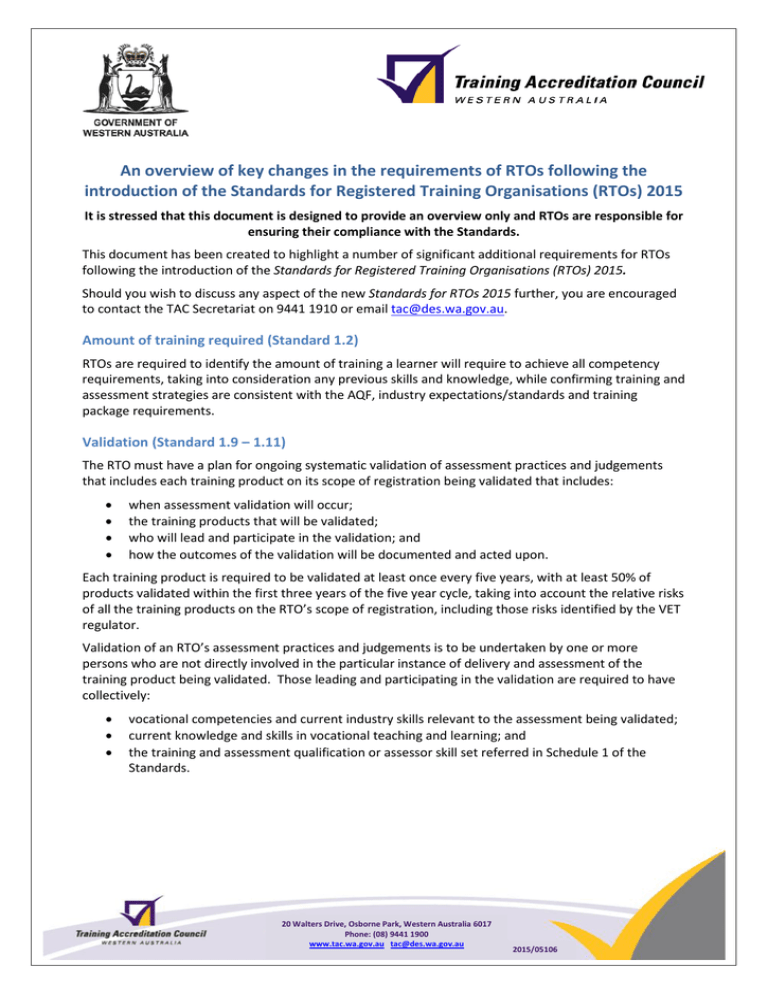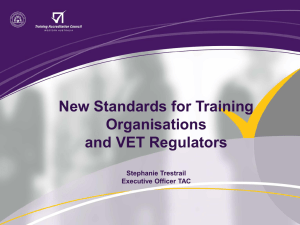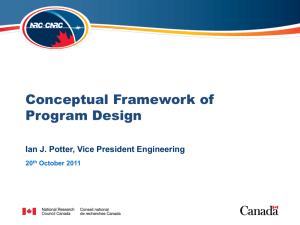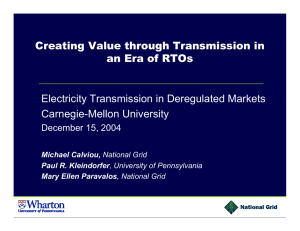An overview of key changes in the requirements of RTOs
advertisement

An overview of key changes in the requirements of RTOs following the introduction of the Standards for Registered Training Organisations (RTOs) 2015 It is stressed that this document is designed to provide an overview only and RTOs are responsible for ensuring their compliance with the Standards. This document has been created to highlight a number of significant additional requirements for RTOs following the introduction of the Standards for Registered Training Organisations (RTOs) 2015. Should you wish to discuss any aspect of the new Standards for RTOs 2015 further, you are encouraged to contact the TAC Secretariat on 9441 1910 or email tac@des.wa.gov.au. Amount of training required (Standard 1.2) RTOs are required to identify the amount of training a learner will require to achieve all competency requirements, taking into consideration any previous skills and knowledge, while confirming training and assessment strategies are consistent with the AQF, industry expectations/standards and training package requirements. Validation (Standard 1.9 – 1.11) The RTO must have a plan for ongoing systematic validation of assessment practices and judgements that includes each training product on its scope of registration being validated that includes: • • • • when assessment validation will occur; the training products that will be validated; who will lead and participate in the validation; and how the outcomes of the validation will be documented and acted upon. Each training product is required to be validated at least once every five years, with at least 50% of products validated within the first three years of the five year cycle, taking into account the relative risks of all the training products on the RTO’s scope of registration, including those risks identified by the VET regulator. Validation of an RTO’s assessment practices and judgements is to be undertaken by one or more persons who are not directly involved in the particular instance of delivery and assessment of the training product being validated. Those leading and participating in the validation are required to have collectively: • • • vocational competencies and current industry skills relevant to the assessment being validated; current knowledge and skills in vocational teaching and learning; and the training and assessment qualification or assessor skill set referred in Schedule 1 of the Standards. 20 Walters Drive, Osborne Park, Western Australia 6017 Phone: (08) 9441 1900 www.tac.wa.gov.au tac@des.wa.gov.au 2015/05106 RPL (Standard 1.12) The Standards now state RTOs must offer RPL to individual learners. Trainers and assessors (Standard 1.14 – 1.15) From 1 January 2016, there is a requirement for persons delivering training and/or conducting assessment to have either TAE40110 Certificate IV in Training and Assessment (or its successor) or a diploma or higher level qualification in adult education. Individuals working under supervision (Standard 1.17 – 1.20) There is a requirement for the RTO to supervise people, and to demonstrate the supervision activity undertaken, when engaging to deliver training an individual who is not a trainer or assessor. From 1 January 2016 any person working under supervision is required to possess one of three skill sets: • TAESS00007 Enterprise Trainer – Presenting Skill Set or its successor; or • TAESS00008 Enterprise Trainer – Mentoring Skill Set or its successor; or • TAESS00003 Enterprise Trainer and Assessor Skill Set or its successor. Training and Education Training Package delivery (Standard 1.21 – 1.25) From 1 January 2016, in addition to having undergone an independent validation of its assessment system, tools, processes and outcomes, the RTO must ensure that all trainers and assessors delivering any AQF qualification or skill set from the Training and Education Training Package (or its successor) hold the training and assessment qualification at least to the level being delivered. From 1 January 2017, the RTO must ensure that all trainers and assessors delivering training and assessment in the Certificate IV in Training and Assessment or its successor, or any assessor skill set from the Training and Education Training Package, either: • hold the TAE50111 Diploma of Vocational Education and Training or its successor; or • hold the TAE50211 Diploma of Training Design and Development or its successor; or • hold a higher level qualification in adult education; or • work under the supervision of a suitably qualified person and do not determine assessment outcomes. Units, skills sets or qualifications that are no longer current (Standard 1.26 – 1.27) The RTO is now required to meet specified time frames in relation to the issuing of qualifications for units, skills sets or qualifications that are no longer current, although an exception exists for the transfer or issuing of certification where a training package requires the delivery of a superseded unit of competency. Third party providers (Standard 2.3 – 2.4) In instances where an RTO engages a third party to provide services on its behalf, there is now a requirement for the RTO to ensure that those services are subject to a written agreement. 20 Walters Drive, Osborne Park, Western Australia 6017 Phone: (08) 9441 1900 www.tac.wa.gov.au tac@des.wa.gov.au 2015/05106 Certification documentation (Standard 3.3 – 3.5) RTOs are now required to issue a learner with AQF certification documentation within 30 days of them being assessed as meeting the training product’s requirements, providing all fees have been paid. In the case of prior learning, where authenticated VET transcripts are presented as evidence, these must be accepted and used as a basis for providing credit. Marketing material (Standard 4.1) The new Standards have far more prescriptive regulation surrounding information that must or must not be disclosed in promotional material and the products that may be marketed. Informing learners (Standard 5.1 – 5.4) It is the responsibility of the RTO to advise the prospective learner as to which training product meets their needs. Where there are to be any changes to the agreed services, the RTO must communicate these to the learner. Complaints and appeals (Standard 6.1 – 6.6) RTOs are required to have policies with defined content to deal with complaints and appeals within specified timeframes. However, in instances where an RTO’s learners are only employees or members who have not been charged fees for training and assessment, the RTO may use the organisation's complaints and appeals policies. Fit and Proper Person requirements (Standard 7.1) The new Standards identify additional grounds which may be considered when determining whether a person is a fit and proper person. Cooperation with the VET Regulator (Standard 8.1 – 8.4) The new Standards impose timelines upon the RTO surrounding the provision of information to the VET Regulator concerning substantial changes and third party providers. Additionally, the RTO is required to submit an annual declaration on compliance with the Standards. The new Standards can be accessed at the following link: Standards for Registered Training Organisations (RTOs) 2015 20 Walters Drive, Osborne Park, Western Australia 6017 Phone: (08) 9441 1900 www.tac.wa.gov.au tac@des.wa.gov.au 2015/05106





